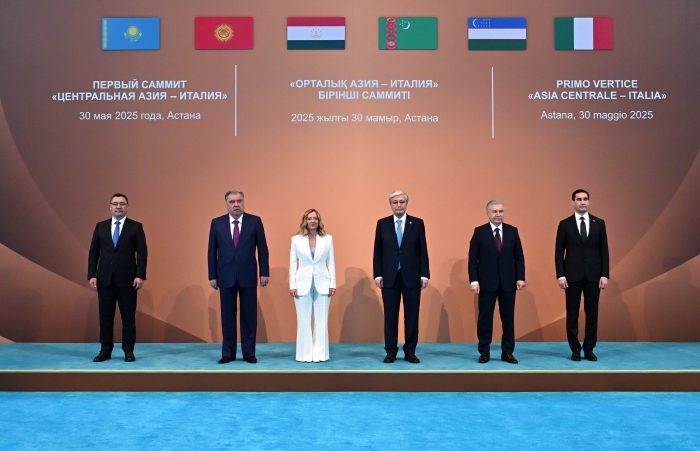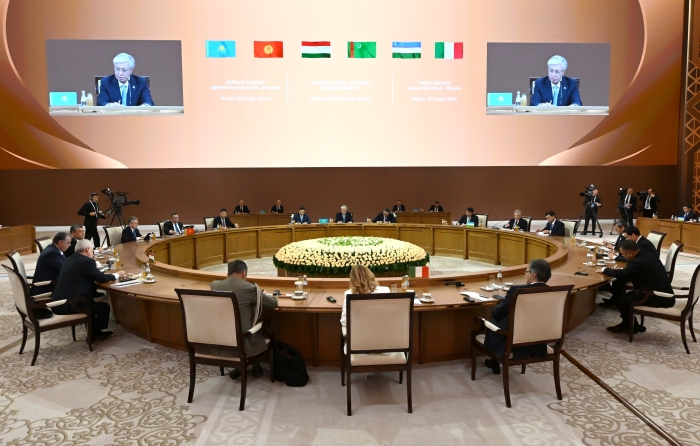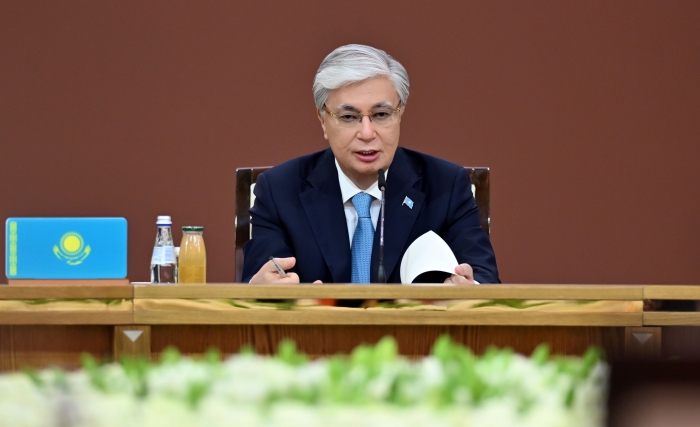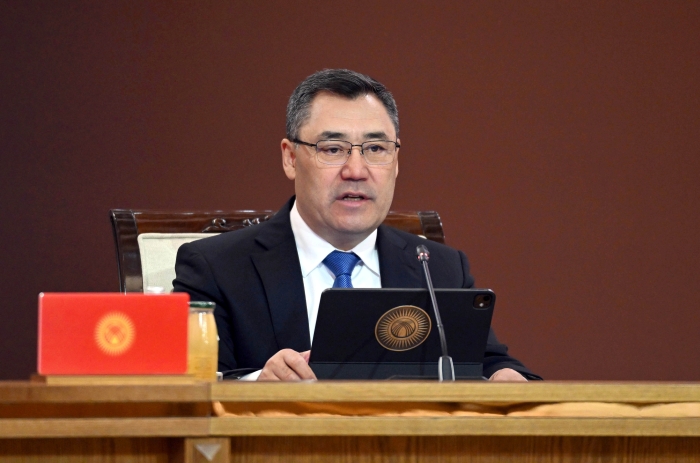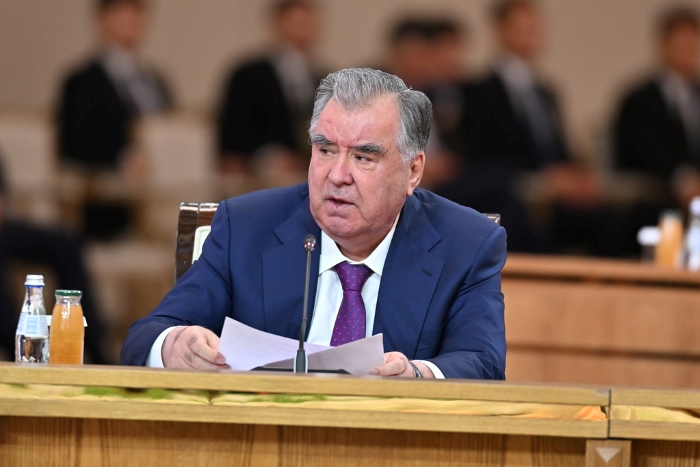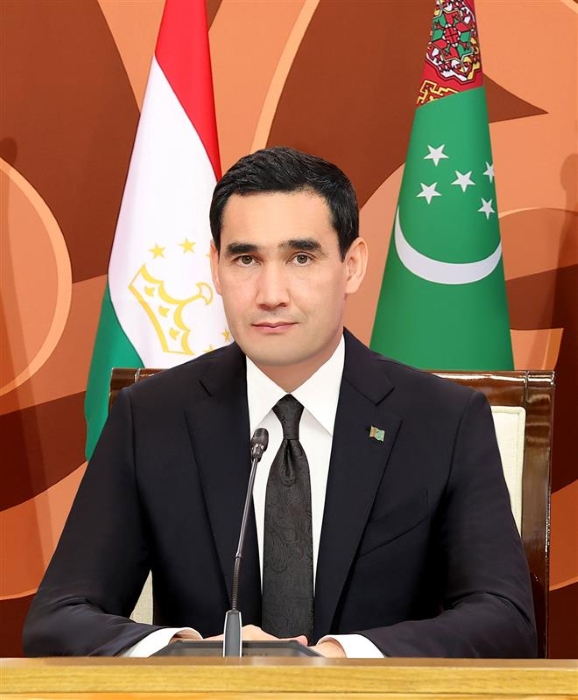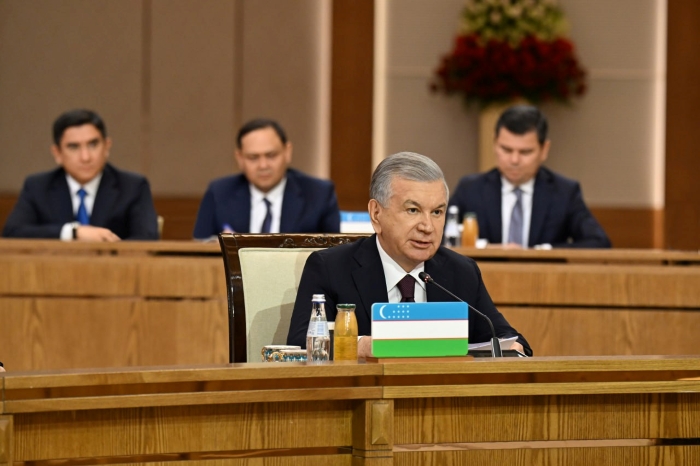On May 30, the first Central Asia–Italy Summit took place in Astana.
The Summit, chaired by the President of the Republic of Kazakhstan, was attended by the Prime Minister of the Italian Republic Giorgia Meloni, President of the Kyrgyz Republic Sadyr Japarov, President of the Republic of Tajikistan Emomali Rahmon, President of Turkmenistan Serdar Berdimuhamedov, and President of the Republic of Uzbekistan Shavkat Mirziyoyev.
The Joint Declaration adopted at the conclusion of the Central Asia–Italy Summit reaffirms the parties’ commitment to deepening strategic partnership. Key areas of focus include economic and energy cooperation, development of transport infrastructure, addressing environmental challenges, strengthening security, and expanding humanitarian ties. The document emphasizes the importance of multilateral dialogue to achieve sustainable development, peace, and stability, laying a solid foundation for further cooperation.
The Declaration highlights Italy’s support for Central Asia’s efforts to enhance regional cooperation through Consultative Meetings of Heads of State. The leaders welcomed the signing of the Treaty on the State Border between Kyrgyzstan and Tajikistan, as well as the agreement on the tripoint border junction of Kyrgyzstan, Tajikistan, and Uzbekistan, contributing to peace and prosperity in the region.
The document notes the steady growth of trade and economic ties between Central Asia and Italy. The leaders committed to deepening cooperation in areas such as natural resources, renewable energy (solar, wind, hydropower), agriculture, and critical infrastructure, including through the EU’s Global Gateway strategy. The importance of attracting investments and supporting small and medium-sized enterprises for sustainable economic growth was underscored.
The Declaration emphasizes the significance of developing the Trans-Caspian International Transport Route (TITR) as an effective corridor between Central Asia and Europe. The leaders called on Italian companies to participate in transport, infrastructure, and consulting projects. The leaders stressed the importance of improving multimodal connectivity, including rail and road, in the region and agreed to continue developing the TITR, thereby reflecting shared priorities also addressed in the EU Global Gateway Strategy.
The leaders agreed to hold the next summit in Kyrgyzstan in 2027 and the Fourth Foreign Ministers’ Conference in Italy in 2026. They expressed gratitude to Kazakhstan for organizing and warmly hosting the first summit.
Overview of Speeches by Central Asian Presidents at the First Central Asia–Italy Summit
Kazakhstan
“Central Asia has served as a bridge between East and West since ancient times, playing a crucial role in fostering inter-civilizational dialogue. Today, our region demonstrates unprecedented unity and a firm commitment to the principles of good neighborliness and collective progress,” said President Tokayev, opening the summit.
As a top priority for developing relations between the region and Italy, President Tokayev emphasized the deepening of trade and economic ties. In his view, special focus should be placed on launching joint projects and expanding the range of goods, particularly non-resource-based products with high added value. “Kazakhstan is capable of increasing exports to Italy for over 100 product categories, amounting to approximately $1 billion,” the President stated.
He believes that Central Asian countries have significant potential to boost supplies of their agricultural products to Europe. Furthermore, the establishment of trading houses and logistics centers could provide a strong impetus to expanding trade between the countries. Specifically, the head of Kazakhstan proposed creating an Italian Trading House in Almaty.
Another pressing task, according to Kassym-Jomart Tokayev, is cooperation in the energy sector, which has traditionally been a cornerstone of Kazakh-Italian partnership. Tokayev expressed readiness to increase oil supplies to the European Union. Last year, Kazakhstan’s oil exports to the Italian market exceeded 30 million tons, a 27% increase compared to the previous year.
The President of Kazakhstan said that strengthening industrial cooperation holds great promise.
Kazakhstan proposed the establishment of a Regional Research Center to consolidate up-to-date information on rare earth metal deposits in Central Asia.
In his opinion, the creation of joint ventures, technology transfers, and the localization of Italian production in the region would bring substantial benefits to Central Asian countries. As an example, he noted that one Kazakhstani plant has started assembling Italian agricultural machinery. Additionally, with the participation of Italian companies, construction has begun on a sulfuric acid production plant and a gas processing facility.
Another critical task highlighted by the President is enhancing transcontinental connectivity. In his opinion, by developing the Trans-Caspian International Transport Route, the countries are effectively reviving the ancient Silk Road on a new basis.
A separate part of the speech was dedicated to environmental protection and sustainability. The Head of State noted that Central Asia is already experiencing the effects of global warming. He expressed gratitude to the Italian side for actively supporting efforts to address the region’s environmental challenges, including the restoration of the Aral Sea basin.
Regarding the development of cultural and humanitarian ties, Tokayev proposed holding a series of joint events in 2026 under the auspices of the Year of Cultural Rapprochement between Central Asia and Italy.
Kyrgyzstan
President Sadyr Japarov emphasized the strategic importance of partnership with Italy, particularly in strengthening economic and industrial ties. He noted a fivefold increase in trade turnover between Kyrgyzstan and Italy over the past four years and highlighted the creation of favorable conditions for foreign investors.
The head of state invited Italian companies to participate in projects in sectors such as hydropower, renewable energy, light industry, banking, digitalization, and tourism.
Special attention was given to the development of transport infrastructure to bolster trade and economic ties with Italy and the EU. The President recalled the start of construction in December 2024 of the China–Kyrgyzstan–Uzbekistan railway, with investments of $8 billion. This project will reduce cargo delivery time from Asia to Europe to 10 days.
Japarov expressed readiness to cooperate with Italy on modernizing logistics chains, implementing digital solutions, and creating efficient transport routes.
In the energy sector, the President focused on developing renewable energy sources, including hydropower and solar energy. He expressed interest in leveraging Italian expertise and technologies to implement “green” projects that support the transition to sustainable energy.
Sadyr Japarov raised the issue of climate change, specifically noting the deteriorating condition of Lake Issyk-Kul. He said that since 1854, the lake’s water level has dropped by nearly 14 meters, and the number of inflowing rivers has decreased from 100–110 to 30–35. The President compared this situation to the Aral Sea catastrophe and called for cooperation with Italy and regional countries to promote sustainable development of mountainous areas.
He highlighted the joint Kyrgyzstan-Italy initiative on the Five-Year Action Plan for Mountain Regions and announced the Second Global Mountain Summit “Bishkek+25” in 2027, inviting partners to participate.
Sadyr Japarov thanked participants for supporting the proposal to hold the next Central Asia–Italy Summit in Kyrgyzstan in 2027. He reaffirmed his country’s commitment to actively participate in implementing joint initiatives aimed at strengthening ties and ensuring mutual benefits.
Tajikistan
President of the Republic of Tajikistan Emomali Rahmon stated that the summit marks an important step in developing relations between Central Asia and Italy.
He emphasized the need to leverage Tajikistan’s potential to deepen multilateral ties, particularly in areas such as hydropower, mining, agricultural production, textiles, and construction materials.
The head of state called on Italian business circles to actively participate in the extraction, processing, and export of Tajikistan’s industrial and agricultural products using advanced technologies and investments.
Trade and economic cooperation was identified as a key area of partnership. The President cited successful collaboration in the light industry, where Tajikistan’s textile enterprises operate with Italian technologies and capital.
To further develop economic ties, he proposed establishing a joint Central Asia investment fund with the Italian Export Credit Agency (SACE) and a trade representation of leading Italian companies in the region.
Rahmon highlighted the importance of cooperation in energy, water resources, and agriculture. Tajikistan’s significant hydropower resources open prospects for joint projects. The production and export of agricultural products were also prioritized for increasing supplies to European markets.
The President underscored the importance of developing regional transport communications and infrastructure, which could serve as a foundation for reviving trade routes connecting Central Asia and Europe. This area was noted as promising for strengthening economic ties.
Special attention in the speech was given to climate change, which poses a serious challenge for the region. The President welcomed the interest of the Italian Climate Fund in collaborating with developing countries to address climate challenges.
Rahmon stressed the importance of joint efforts to combat global threats such as terrorism, extremism, radicalism, cybercrime, and illicit drug trafficking. He called for continued cooperation to counter these challenges amid an unstable international environment.
Turkmenistan
President Serdar Berdimuhamedov highlighted the active engagement of Central Asian countries aimed at the region’s sustainable development. He emphasized the outcomes of the Sixth Consultative Meeting of Central Asian Heads of State (September 2024, Astana), which adopted a Joint Statement and the Concept of Regional Cooperation “Central Asia–2040.” These documents outline strategic directions for cooperation in politics, security, economy, transport, climate, and water resources.
A central theme of the speech was security, which Turkmenistan views as a holistic and indivisible concept. The President underscored the UN’s role as a universal mechanism for ensuring global stability and recalled Turkmenistan’s proposal to declare 2025 the “International Year of Peace and Trust,” endorsed by the UN General Assembly in March 2024. He also announced the International Forum for Peace and Trust, scheduled for December 12, 2025, in Ashgabat, inviting heads of state and government to participate.
Special attention was given to the situation in Afghanistan. Turkmenistan advocates for dialogue with the country’s new de-facto authorities, the implementation of major infrastructure projects such as the Turkmenistan–Afghanistan–Pakistan gas pipeline, power transmission lines, and railways, as well as providing humanitarian aid to the Afghan people.
In the economic sphere, the President identified energy, transport, industry, digitalization, and “green” technologies as priority areas. Turkmenistan, with its vast natural gas reserves, aims to diversify its supply routes, including to Europe. In hydrogen energy, Turkmenistan sees potential for cooperation with Italy. In transport, the President noted the prospects of the “Middle Corridor” as a key route between Asia and Europe.
Environmental issues also held a prominent place in the speech. Turkmenistan supports initiatives to enhance energy efficiency, rational water use, and the adoption of “green” technologies. The President recalled the initiative to establish a UN Regional Center in Ashgabat for climate change-related technologies in Central Asia, underscoring the country’s ambitions in addressing global environmental challenges.
Serdar Berdimuhamedov highlighted the centuries-old cultural and historical ties between Italy and Central Asia, including contacts between Ancient Rome and the Parthian Empire and the role of the Great Silk Road. He praised the work of Italian archaeologists in Turkmenistan and announced an exhibition, “The Flourishing of Cultures: Bronze Age Margiana and the Parthian Empire,” to be held in Rome, which will strengthen cultural ties.
In education, the President noted the interest of Turkmen youth in studying the Italian language and culture, as well as the importance of inter-university cooperation.
In conclusion, the President reaffirmed Turkmenistan’s commitment to deepening cooperation with Italy both bilaterally and within the “Central Asia–Italy” format.
Uzbekistan
President Shavkat Mirziyoyev emphasized the importance of regular contacts at the level of foreign policy agencies to coordinate positions on international issues. He proposed creating working mechanisms for multilateral partnership and information exchange between special services to combat terrorism, extremism, radicalism, drug trafficking, and illegal migration, which are priorities for ensuring regional and global security.
The head of Uzbekistan noted significant progress in trade and economic relations with Italy, highlighting a threefold increase in trade turnover and investments in recent years.
Successful technological cooperation projects with leading Italian companies serve as an example of fruitful partnership. To further strengthen business ties, the President proposed establishing a “Central Asia–Italy” Business Club under the auspices of chambers of commerce and industry, with annual meetings of entrepreneurs in the capitals of the region and Italy.
Mirziyoyev also called for the development of a comprehensive Program for Industrial and Technological Cooperation to facilitate technology transfer, the adoption of advanced knowledge, and the establishment of high-tech industries. Among priority areas, he highlighted deep processing of mineral resources and agricultural raw materials, production of equipment for various industries, localization of components, and the creation of design centers with the participation of Italian brands.
To implement major projects, a special industrial park is being established in the Tashkent region under the management of a European operator, with the involvement of Italian agencies SACE and SIMEST.
The President highly valued cooperation with Italy in the field of “green” transformation and proposed creating a multilateral platform for implementing national decarbonization programs. He expressed readiness for projects in renewable energy, including the supply of “green” energy to EU countries, modernization of water infrastructure, improving energy efficiency of enterprises, and developing hydrogen technologies with the participation of leading Italian companies.
Shavkat Mirziyoyev noted the successful operation of branches of the Turin Polytechnic and Pisa Universities in Tashkent, welcoming the interest of other Italian universities in the region.
He proposed establishing a “Central Asia–Italy” Scientific and Educational Consortium to fund research, academic exchanges, and training in fields such as engineering, design, water-saving technologies, and biotechnology.
In the tourism sector, the President proposed launching a tourism alliance to create joint tourism products and foster partnerships between operators.
He also noted the interest of the Italian public in Uzbekistan’s cultural events held in Rome and Florence and proposed organizing a Youth Forum on Creative Economy and Cultural Exchange of Central Asia and Italy in Khiva in 2026.
***
Having completed the program of the working visit to the Republic of Kazakhstan, the President of Turkmenistan returned to Ashgabat. ///nCa, 31 May 2025 (photo credit – official websites of the Presidents of Kazakhstan, Kyrgyzstan, Tajikistan, Uzbekistan)
